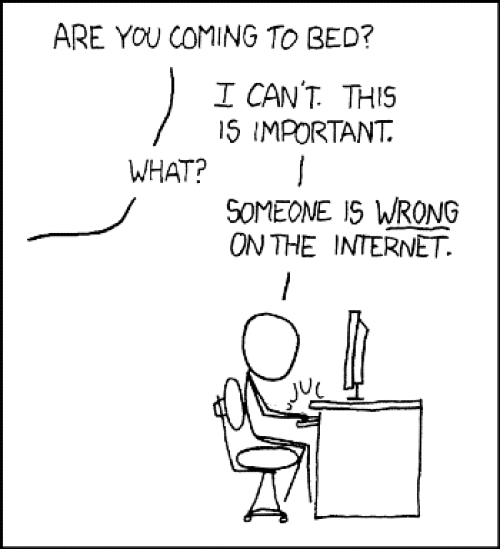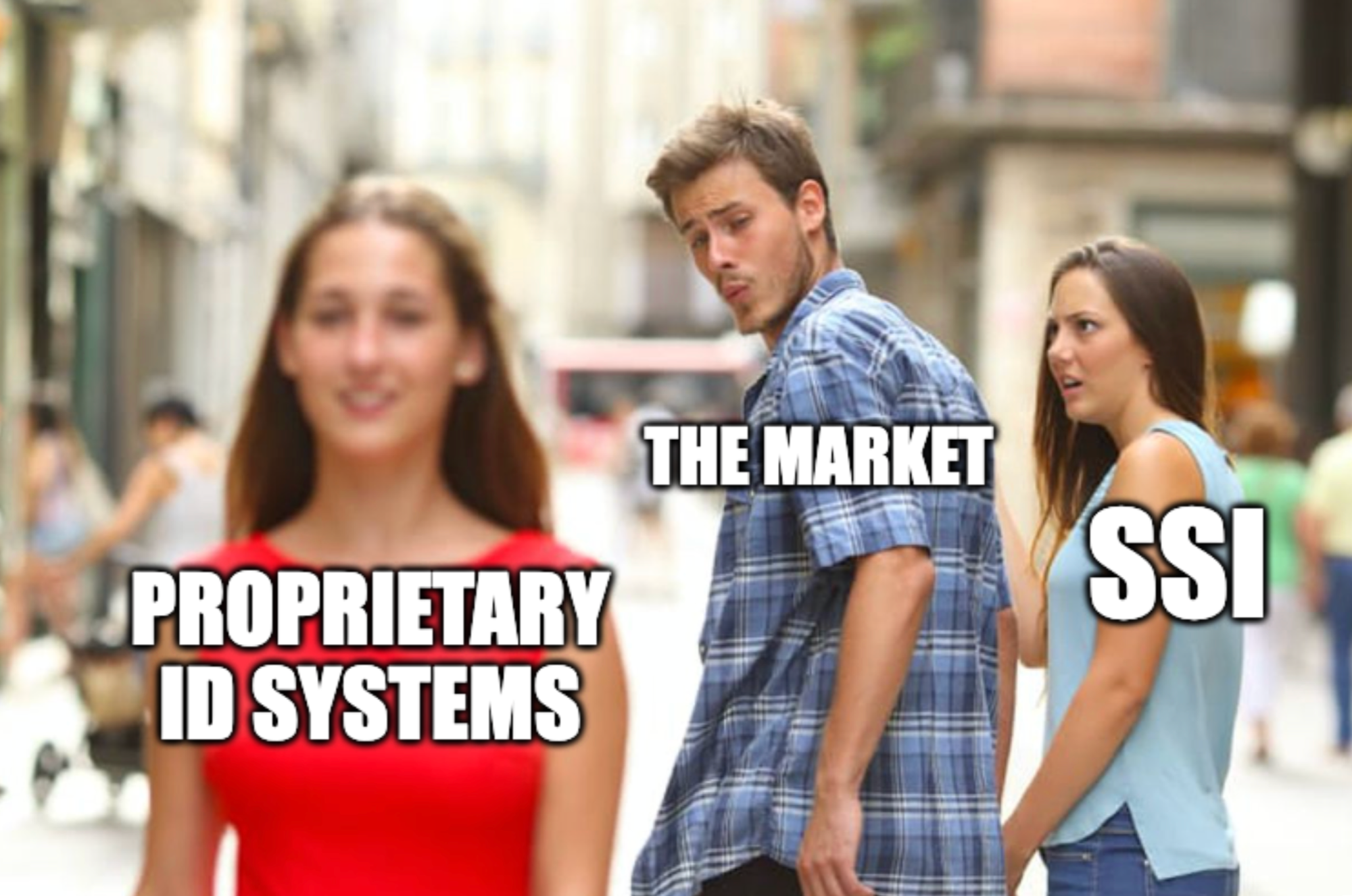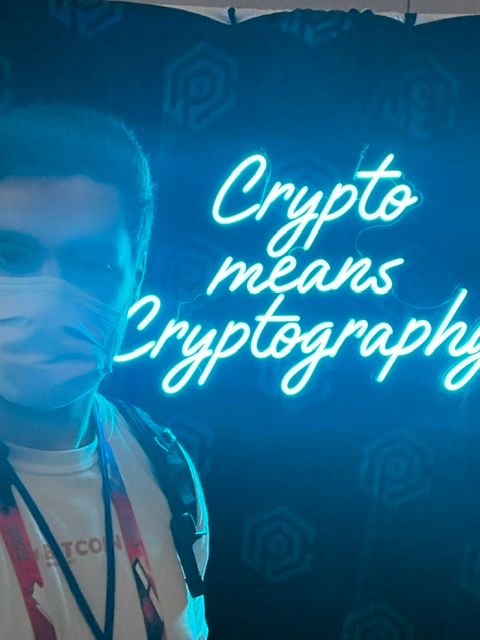A forewarning—there will be no tears here and, please, no hugging.

The post I'm responding to makes a point about people resisting its conclusions because their livelihoods depend on it. But let’s be real—Trinsic depends on this too, just as much as mine does. We’re both here, with skin in the game, and that's a good thing. I continue to work on figuring out how to make self-sovereign identity work at scale because I believe it's worth it. If I was not convinced of its value, I wouldn't be here debating it; I'd have moved on to easier, more profitable paths. That’s the commitment this industry requires—guts, patience, and a long-term perspective.
So let's set the stage clearly. This isn't just about egos or jobs; it's about a vision for the future of digital identity. And while you’ve pivoted, it's worth looking at the broader picture and challenging the notion that SSI is somehow "dead" just because it's hard. We’re not the first to face a daunting path—nor will we be the last.
The Market Isn't the Oracle You Think It Is
Your unwavering faith in the market's infallibility is touching. You proclaim, "The market is the objective reality," as if channeling the spirit of a laissez-faire economist at a startup retreat. But let's examine recent history.
Betamax was superior to VHS, but marketing muscle won the day. The QWERTY keyboard isn't ergonomic, yet it's entrenched due to historical happenstance. The invisible hand often leads us down paths of inefficiency and fragmentation, leaving a trail of superior but abandoned technologies in its wake.
Fragmentation and incompatible standards aren't signs of the market "choosing" the best option; they're about who can shout "MINE!" the loudest while elbowing competitors off the playground. Sometimes, it takes a guiding hand—a nudge from governments or standard bodies—to steer the market toward what's efficient and beneficial for all.
Pivoting Isn't Prophecy

The leap from "We couldn't make it work" to "It can't work" is a logical chasm too wide to cross. Your pivot from SSI evangelist to skeptic, while understandable, isn't a revelation of universal truth.
This is akin to Friendster declaring social media a dead end, or Blockbuster declaring video streaming a passing fad. The inability to monetize a nascent technology doesn't negate its potential; it merely highlights the gap between visionary ideals and the brutal realities of running a startup. For example, certain decentralized identity projects have successfully implemented verifiable credentials in applications like educational certificates, employment verification, and gaining access to the financial system, demonstrating real-world utility and growing momentum. These efforts show that verifiable credentials are gaining traction in specific, focused use cases.
Let me be unequivocal: I commend you for having the guts to start a company, work hard for years, and continue to try to make it viable. That is nothing short of admirable. Your pivot might make sense for Trinsic, but it's hardly the canary in the coal mine for SSI.
SSI, like many transformative technologies before it, may simply be awaiting its "streaming moment" — that convergence of technological readiness, market understanding, and user demand that catapults it from interesting concept to indispensable tool.
The Power of Collective Standards
Dismissing government involvement as a mere "silver lining" is like calling the sun a "helpful light bulb." Let's not overlook crucial historical precedents.
The internet (ARPANET), GPS, and even time zone standardization were government initiatives. The metric system, USB, and Wi-Fi all benefited from coordinated efforts beyond market forces. These standards didn't become universal because the market willed them so, but because of coordination to prevent fragmentation.
It is important not to ignore this. Preventing the chaos of incompatible systems often requires patience and collaboration—yes, even more patience than the industry has shown to this point.
Scattered Seeds Grow Diverse Forests
Your lament that SSI's "heat map is too scattered" misses the point. This diversity isn't a bug—it's a feature. The applications sprouting in education, finance, healthcare, and agriculture worldwide are the seeds of a diverse forest, not a failed monoculture.
Yes, SSI's initial user experience may be challenging, but that's par for the course with transformative technologies. Remember when 2G networks made downloading a single image feel interminable? Or when dial-up internet's screeching was our daily soundtrack?
Every groundbreaking technology endures growing pains. Users adapt, technologists adapt, and the market adapts with them—especially when the endgame offers control, privacy, and empowerment.
Business Goals Aren't Universal Truths
There's a profound difference between "We couldn't make it work for our business" and "The technology is inherently flawed."
Your focus on immediate market adoption overlooks the long-term value of doing the right thing—the hard thing—the thing that maybe, honestly, is not suited for startups that need to show growth and profit now. Perhaps a successful SSI startup is better suited as a B-Corp.
While market challenges are real, the problems that led us to SSI have only grown more severe. Data breaches are no longer news; they're an expectation. Surveillance Capitalism has entrenched itself deeper into the fabric of our digital lives, commodifying our every interaction. Government-issued digital identities, on the hardware of monopolistic tech giants, laced with privacy-eroding mandates, threatening to erode what little privacy we have left.
SSI isn't just a novel technology; it is our defense against these escalating digital threats.
Focused Implementation
While the post laments the scattered nature of SSI adoption, I see this differently. There is a clear answer to the diversity challenge: focus on specific, high-impact use cases. Our net is intentionally not cast wide.
We don't require credentials to be used across different domains from which they were issued. That's a potential bonus, not a requirement. It does not undermine the original goal of the technology; optionality is a strength. It leaves the door open for future cross-domain adoption without dependence on it for current success.
This focused strategy allows us to deliver value in targeted areas while building the infrastructure for broader adoption. It’s a pragmatic approach that addresses immediate needs while paving the way for SSI’s long-term vision. An iterative approach helps build confidence in the SSI ecosystem, one application at a time.
The success of SSI won't come from boiling the ocean. We’re laying the groundwork for future interoperability while delivering value today.
A Vision Beyond The Fiscal Calendar
While some may chase immediate market opportunities, many of us remain committed to SSI's promise. Transformational change isn't measured in fiscal quarters but in steady progress over years, many years. It demands fortitude, collaboration, and a willingness to look beyond short-term gains.
To the SSI community: Let this be our rallying cry. We're not just building a product; we're creating the foundation for human-centric digital identity. Let's continue to collaborate on improving user experience, pushing interoperability, and engaging governments and standards organizations. Every effort, no matter how small, contributes to a future where secure, privacy-respecting, self-sovereign digital identity is the norm.
The most compelling technological advances come from those who persevere when the path gets steep. The future of digital identity—one that isn't controlled solely by governments or tech monopolies—is counting on us.

Should you find yourself at the next IIW, or the one after that, perhaps hosting a session titled "I Was Wrong About Being Wrong About SSI," feel free to invite us—we'll be there. We won't cry, clap, or hug you. We'll simply nod, in recognition that the most profound insights often come from pushing through challenges, not pivoting away from them.

